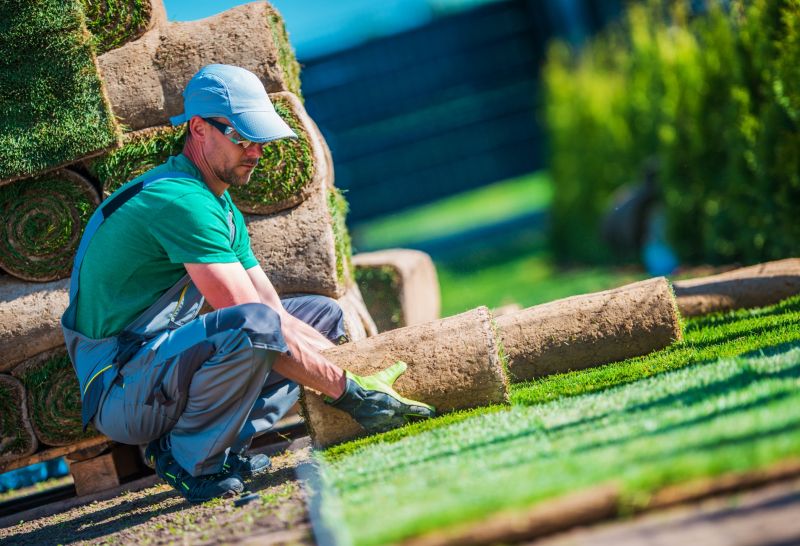Favorite Products for Turf Field Setup and Maintenance
Identify trusted products that support both installation and ongoing maintenance of durable and safe turf fields.
 Installing a turf field requires careful selection of products that ensure durability, safety, and performance. From foundational layers to surface materials, each component plays a vital role in creating a functional and long-lasting field. Proper planning and choosing quality products can help mitigate issues such as uneven surfaces, drainage problems, and premature wear. The process typically involves preparing the base, installing shock pads, laying down the turf, and securing all components to withstand regular use.
Installing a turf field requires careful selection of products that ensure durability, safety, and performance. From foundational layers to surface materials, each component plays a vital role in creating a functional and long-lasting field. Proper planning and choosing quality products can help mitigate issues such as uneven surfaces, drainage problems, and premature wear. The process typically involves preparing the base, installing shock pads, laying down the turf, and securing all components to withstand regular use.
Top Overall Option
Multi-Layer Turf Installation System
A comprehensive multi-layer system that includes a durable sub-base, shock-absorbing padding, and high-quality turf. Designed for versatility and long-term performance, this setup provides a stable foundation, effective drainage, and a safe playing surface. Ideal for various sports and recreational fields, it offers a balanced combination of support and cushioning. Properly installed, this system can help optimize field usability and maintenance.
Types of Products For Turf Field Installations
Crushed Stone Sub-Base
Provides foundational support and drainage for the turf field, ensuring stability and water runoff.
Geotextile Fabric
Used as a separator layer to prevent mixing of sub-base and surface materials, enhancing durability.
Shock Absorbing Padding
Installed beneath the turf to improve safety and cushioning for players.
Artificial Turf Rolls
The primary surface material, available in various pile heights and densities for different use cases.
Seam Tape and Adhesives
Facilitates seamless joining of turf sections, ensuring a uniform playing surface.
Edge Restraints
Keeps turf in place and prevents edges from lifting or shifting over time.
Drainage Pipes and Systems
Ensures effective water removal, reducing field downtime after rain.
Infill Materials
Materials like rubber granules or sand that provide cushioning and traction.
Landscape Fabric
Prevents weed growth and stabilizes the base layer.
Turf Anchors and Stakes
Secure turf edges and seams during installation and maintenance.
Surface Cleaning Equipment
Tools for maintaining and grooming the turf to extend its lifespan.
Lighting Systems
Illuminate the field for extended usage and safety during nighttime activities.
Perimeter Fencing
Provides security and delineation for the turf area.
Waterproof Membranes
Protect underlying layers from moisture and water infiltration.
Roller and Compaction Equipment
Ensures proper settling and leveling of base layers during installation.
Surface Infill Spreaders
Distributes infill evenly across the turf surface for consistent performance.
Popular Choices
Commonly used as a stable sub-base for drainage and support.
Widely selected for joining turf sections seamlessly.
Popular for providing cushioning and safety under the turf.
Used as an infill or joint filler for stability and drainage.
Frequently chosen for impact absorption and safety enhancement.
Ensures efficient water flow beneath the turf surface.
Popular for maintaining turf boundary integrity.
Commonly used to secure turf edges and seams during installation.
A preferred surface material for its realistic appearance and durability.
Frequently installed to facilitate quick water runoff.
Popular for weed prevention beneath the turf layers.
Trending for enabling night-time field use.
Commonly added for security and boundary definition.
Chosen for protecting the base layers from moisture.
Frequently used to ensure a stable base during installation.
Popular for maintaining evenness and cleanliness of the turf.
The foundational layers are critical for stability and drainage. These include sub-base materials like crushed stone or gravel, which provide a solid foundation and facilitate water runoff. Surface infill materials are equally important, as they impact the turf's cushioning and traction. Different types of infill, such as rubber granules or sand, are selected based on the intended use and safety standards. Proper installation techniques and high-quality products can help ensure the turf remains level and safe over time.
In addition to the primary layers, accessories such as seam tapes, edging materials, and drainage systems contribute to the overall integrity of the field. Seam tapes help join turf sections seamlessly, while edge restraints prevent shifting and uplift. Effective drainage systems are essential for quick water runoff, minimizing downtime due to weather conditions. Selecting products that are compatible and designed specifically for turf installation can streamline the process and improve the longevity of the field.
Key Buying Considerations
- Field usage and activity level to determine turf density and infill type.
- Drainage capabilities of the base layers to prevent water pooling.
- Compatibility of components, ensuring all products work together seamlessly.
- Durability and UV resistance of turf and accessories for long-term performance.
- Ease of installation and availability of professional services if needed.
- Maintenance requirements to keep the turf in optimal condition.
- Safety features such as impact absorption and traction properties.
- Field size and layout to accommodate specific sports or activities.
- Budget constraints balanced with quality and longevity.
- Local climate conditions that may influence material choice and installation methods.
- Regulatory standards and safety guidelines relevant to the intended use.
- Availability of replacement parts and ongoing support from suppliers.
- Environmental factors, such as water runoff and soil stability.
- Compatibility with existing infrastructure if upgrading or expanding an existing field.
- Warranty and product support offered by manufacturers or suppliers.
This page contains affiliate links. We may earn a commission if you make a purchase through these links, which helps support our content creation.
